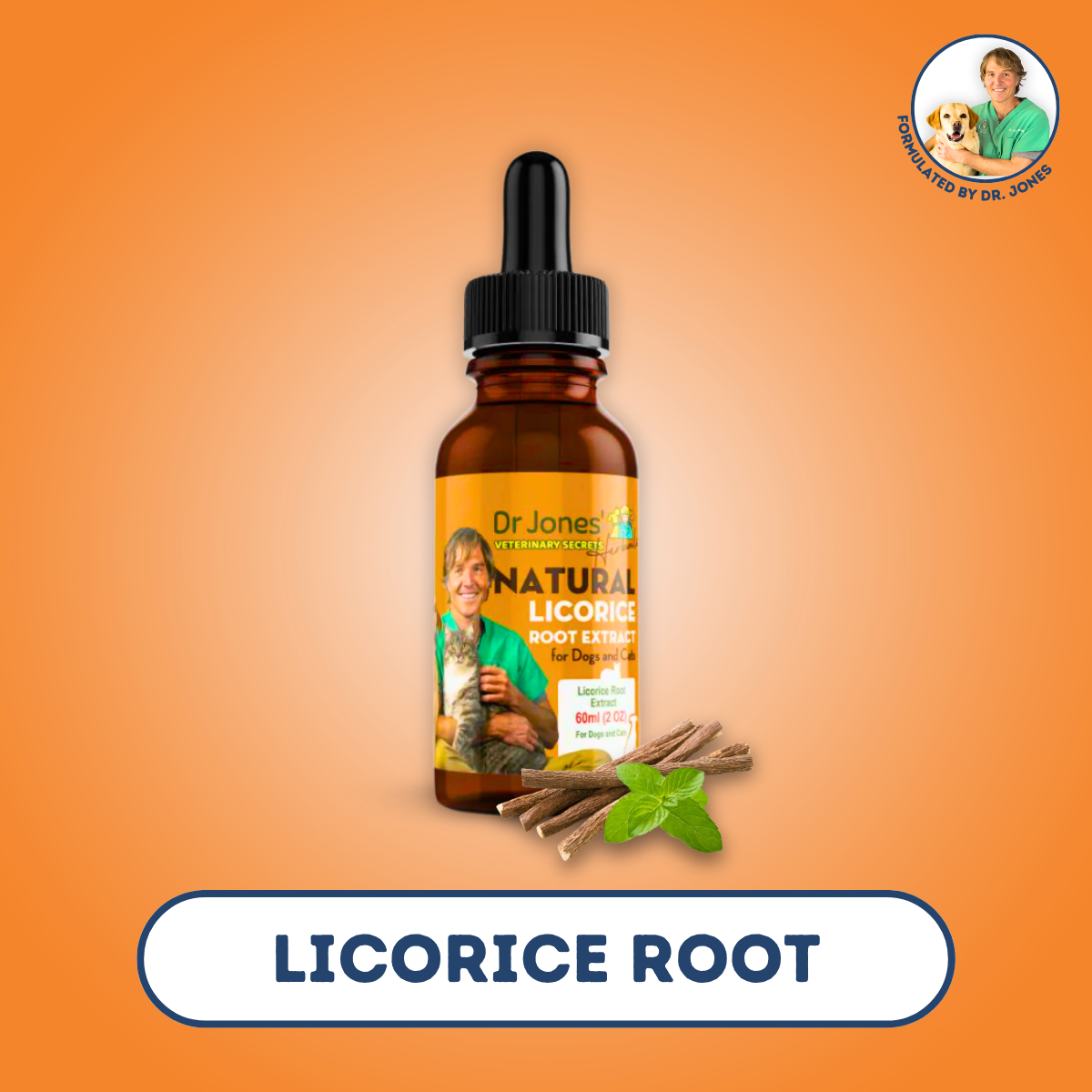Hidden Kitchen Remedies: 3 Natural Cures for Your Pet’s Pain and Allergies
![]()


Hidden in Your Kitchen: 3 Powerful Remedies for Pets!
You’ve probably heard a lot about home remedies, and with good reason—natural remedies can often work wonders for our pets. Now, I know the big drug companies won’t tell you this, but there are many common ingredients right in your kitchen that can help your pets with pain, inflammation, and even allergies.
For example, Licorice Root is one of my go-to herbal remedies. It’s used for everything from allergies to arthritis, and even coughs, making it a must-have in my holistic treatment toolkit. I use it topically to help with itching and have seen excellent results. In fact, I’ve recently made it available through Dr. Jones’ Licorice Root Extract for Pets.
But it doesn’t stop there—there are plenty of natural remedies you can easily find in your kitchen that are safe, affordable, and highly effective. Let me share three of my favorite kitchen ingredients that can benefit your pet’s health: potato, cabbage, and beeswax with coconut oil.

1. Potato: The Humble Healer
Potatoes are often overlooked when it comes to natural remedies, but they’re packed with vitamins, polyphenols, flavonoids, and zinc—key compounds that help with healing and reducing inflammation. In fact, research shows that applying potato peel extract gel to wounds can speed up healing by promoting collagen production and closing wounds faster.
How to Use:
-
Take a potato (it costs less than 20 cents) and slice it into thin slabs.
-
Use a rolling pin to crush the potato, breaking up the pulp and peel to release the healing compounds.
-
Apply the moist, crushed potato peel directly to the wound for 1-2 minutes. Leave it on longer if needed.
-
For acute wounds, apply four times a day, reducing to twice a day after the first few days.
I’ve used this method on Tula, my dog, who had a chronic wound on her nostril. It’s cost-effective and works wonders!
2. Cabbage: Nature’s Anti-Inflammatory
Cabbage isn’t just for human health—it works wonders for pets, too! Rich in sulfur compounds, polyphenols, and anti-inflammatory enzymes, cabbage can help reduce swelling and promote healing. One study found that cabbage extract has anti-inflammatory effects similar to non-steroidal anti-inflammatory drugs (NSAIDs), but without the harmful side effects.
How to Use:
-
Take a cabbage leaf and crush it with a rolling pin to release the healing enzymes.
-
Apply the crushed cabbage leaf directly to your pet’s skin for 1-2 minutes.
-
For best results, apply it four times a day for acute conditions, and reduce to twice a day for long-term use.
I’ve seen great results with Tula, especially for her skin issues. It’s a quick and natural remedy that helps with pain and inflammation.
3. Beeswax and Coconut Oil: A Healing Blend
When combined, beeswax and coconut oil create a powerful blend that can help with wound healing. Coconut oil has anti-inflammatory and antibacterial properties and can improve wound healing by increasing collagen formation. Beeswax not only provides a protective layer but also boosts the antimicrobial properties of the mixture.
How to Make and Use:
-
Melt 2 tablespoons of coconut oil and 1 teaspoon of beeswax in a small pot over medium heat for about 5 minutes.
-
Once melted, pour the mixture into a small jar and let it cool in the fridge for 20 minutes.
-
Once cooled, apply the mixture topically to your pet’s wound or irritated skin.
-
Use twice a day for 7-10 days or as needed.
This remedy has worked wonders for Tula’s nostril wound. It smells great, and if your pet happens to lick it, there’s no harm done.
Heal Your Pet At Home!
These three simple, inexpensive kitchen remedies—potato, cabbage, and beeswax with coconut oil—can help heal your pet’s wounds, reduce inflammation, and even relieve allergies. They’re safe, effective, and natural, which is why I rely on them in my holistic approach to pet care.

If you’re dealing with itching or allergies, I also recommend Licorice Root Extract. It’s often referred to as the “natural corticosteroid,” and I’ve seen it work fast for pets like Jesse, a dog we adopted from my dad. If you’re interested, check out Dr. Jones’ Licorice Root for Dogs and Cats, which is now available in a glycerin base that’s safe and tasty for pets.
Thank you for reading, and as always, here’s to your pet’s health and happiness!

P.S. Don’t forget—these natural remedies can be just as effective, if not more, than conventional treatments. So, before you reach for chemical-based solutions, consider using what’s already in your kitchen!
Why Choose Dr. Jones’ Natural Licorice Root Extract?
-
Allergy Relief: Licorice root is a natural anti-inflammatory that soothes allergic reactions, helping to reduce itching, redness, and swelling in pets.
-
Supports Skin Health: By calming irritation and promoting healing, licorice root helps maintain healthy skin and coat, especially for pets prone to allergies.
-
Immune System Balance: It aids in modulating your pet’s immune response, preventing overreactions to environmental allergens.
-
Easy to Administer: The liquid drops are simple to use—just add them to your pet’s food or give directly.
-
Safe and Natural: Made from the highest-quality ingredients, Dr. Jones Herbals provides safe, effective care for your pet.
Dr. Jones’ Licorice Root Extract is formulated with glycyrrhizin, a compound that has natural anti-inflammatory properties to help reduce allergic reactions. For dogs and cats, it means relief from common allergy symptoms like itching, hot spots, and inflamed skin.
Ready to give your pet the relief they deserve? Discover Dr. Jones’ Licorice Root Extract today for a natural, easy way to manage allergies and support your pet’s overall health.













